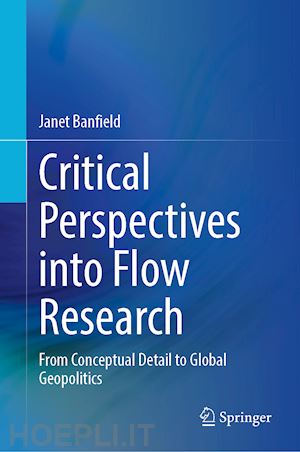

Questo prodotto usufruisce delle SPEDIZIONI GRATIS
selezionando l'opzione Corriere Veloce in fase di ordine.
Pagabile anche con Carta della cultura giovani e del merito, 18App Bonus Cultura e Carta del Docente
This book breaks down barriers between disciplines engaging with flow, by speaking from geography into psychology to establish geographical foundations for this psychological phenomenon. It frames and works with the multiple contradictions within the extant literature as productive rather than prohibitive, thereby encouraging collaboration across discrepancies as well as across disciplines. It incorporates new materials and perspectives to research on flow, including aesthetic theory, new materialism, more-than-human geographies, and critical development geographies to broaden the theoretical and empirical landscape of future flow scholarship. It also digs more deeply into pre-existing areas of interest within flow research than has been done before, for example, with respect to ‘dark’ flow, ‘flowability’ and (tele)presence, to facilitate more nuanced engagement with such terms. It takes a step back from the detailed empirical work that characterizes most current flow research to pose questions as to how such divergent, even contradictory, findings can emerge from scholarship on a supposedly universal experience that is purportedly robustly constructed, and whether this contrariness is necessarily problematic or emblematic of flow itself and therefore worthy of conceptual elaboration. Finally, it evokes global scale and long-term critical perspectives on the future evolution of flow to counteract the presentism within existing work that emphasizes immediate gains (e.g., performance, wellbeing, profit), in an attempt to pre-empt the worst ramifications of the progressive commodification and strategization of flow. This innovative book is of interest to scholars from a range of fields, from psychology, to business and human resource management, leisure studies, and critical human geography.
Critical Geographies of Optimal Experience.- CONCEPTS AND MODELS.- Introduction to Part I A Diffuse Archipelago of Constructs.- The Componential Model and its Discontents.- Channel and Process Models of Flow .- Conclusion to Part I Bridging the archipelago.- ACTUAL AND VIRTUAL PLACES.- Problematising Place.- Actual Places.- Virtual Places.- Conclusion to Part II Flow as Place-Making.- MANIPULATIONS AND INTERVENTIONS.- Introduction to Part III Instrumentalising Flow.- Spaces of Flow Manipulation.- Flow Interventions in Place.- Conclusion to Part III Recrafting the Future of Flow.- Conclusion to Part III Recrafting the Future of Flow.- Conclusion: Hopeful Geographies of Optimal Experience.
Janet Banfield is a college lecturer in geography at Hertford College, the University of Oxford, but she also has one foot in psychology. She additionally teaches at St. Anne’s and St. Catherine’s colleges at the University of Oxford. Whether pedagogically, conceptually or empirically oriented, her ethos is to examine the assumptions and ideas of one discipline through the lens of the other. Her topical focus lies in cultural geography, exploring the creation and experience of place through cultural forms and activities, from artistic practice to puppetry. From a theoretical perspective, Janet works in ‘non-representational’ geography/psychology, which is concerned both with the work that representations do in the world (i.e., the difference that they make) and with the role of the non-representational (e.g., feelings, sensations, intuition) in the workings of the world. Her academic interests are practice-based and autoethnographic and are concerned as much with methodological and pedagogical innovation as with the generation of new empirical knowledge and conceptual frameworks. Working in interdisciplinary fashion, Janet seeks to advance the benefits of psychology by forging stronger connections with geography, and vice versa.











Il sito utilizza cookie ed altri strumenti di tracciamento che raccolgono informazioni dal dispositivo dell’utente. Oltre ai cookie tecnici ed analitici aggregati, strettamente necessari per il funzionamento di questo sito web, previo consenso dell’utente possono essere installati cookie di profilazione e marketing e cookie dei social media. Cliccando su “Accetto tutti i cookie” saranno attivate tutte le categorie di cookie. Per accettare solo deterninate categorie di cookie, cliccare invece su “Impostazioni cookie”. Chiudendo il banner o continuando a navigare saranno installati solo cookie tecnici. Per maggiori dettagli, consultare la Cookie Policy.